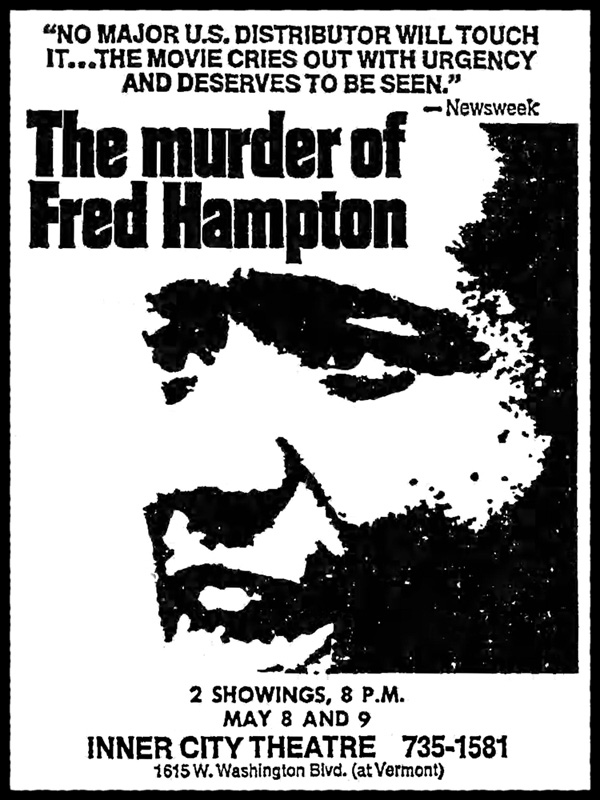|
THE MURDER OF FRED HAMPTON (1971).
 What's the most efficient way to deal with a 'freedom fighting revolutionary' who has a growing following? That's easy. Kill him! Unfortunately, we're not discussing some old Rambo knock-off, but instead a riveting b&w documentary that focuses on the short life of Fred Hampton, the founder of the Illinois chapter of the Black Panther Party, who, at the age of 21, was assassinated by a FBI-organized unit of the Chicago Police Department as he lay face down in his bed. Sadly, this powerful film is rarely screened nowadays, and if 'The Man' had his way, it never would've been released. Directors Howald Alk (who later helmed the Joplin doc JANIS, and helped shoot and edit Dylan's RENALDO AND CLARA) and Michael Gray (co-writer of THE CHINA SYNDROME) began the project in '68, and its first half focuses on the charismatic young activist's life and work, as he rallies the public to rebel against the oppressive power structure and educates supporters that if a "pig" gets in their way, simply pull your gun and "blow him away." Amidst clips of Chicago 7-alum Rennie Davis and Panther/future-congressman Bobby Rush, we also see Hampton and the Panthers establishing free clinics and pre-school meals in poor neighborhoods, setting up a mock trial, discussing politics, being accused of an ice cream truck robbery (which led to a 25-year prison sentence for Hampton!), arming themselves in case of attack, and happily celebrating when cops are shot during a raid on their HQ. The film's chilling second half centers on Hampton's death and begins in the pre-dawn moments of December 4, 1969, What's the most efficient way to deal with a 'freedom fighting revolutionary' who has a growing following? That's easy. Kill him! Unfortunately, we're not discussing some old Rambo knock-off, but instead a riveting b&w documentary that focuses on the short life of Fred Hampton, the founder of the Illinois chapter of the Black Panther Party, who, at the age of 21, was assassinated by a FBI-organized unit of the Chicago Police Department as he lay face down in his bed. Sadly, this powerful film is rarely screened nowadays, and if 'The Man' had his way, it never would've been released. Directors Howald Alk (who later helmed the Joplin doc JANIS, and helped shoot and edit Dylan's RENALDO AND CLARA) and Michael Gray (co-writer of THE CHINA SYNDROME) began the project in '68, and its first half focuses on the charismatic young activist's life and work, as he rallies the public to rebel against the oppressive power structure and educates supporters that if a "pig" gets in their way, simply pull your gun and "blow him away." Amidst clips of Chicago 7-alum Rennie Davis and Panther/future-congressman Bobby Rush, we also see Hampton and the Panthers establishing free clinics and pre-school meals in poor neighborhoods, setting up a mock trial, discussing politics, being accused of an ice cream truck robbery (which led to a 25-year prison sentence for Hampton!), arming themselves in case of attack, and happily celebrating when cops are shot during a raid on their HQ. The film's chilling second half centers on Hampton's death and begins in the pre-dawn moments of December 4, 1969,  when the police fired 99 rounds(!) into his apartment. We witness footage of the crime scene, Fred's blood-soaked mattress, bullet-riddled walls, plus Hampton's funeral, even as the police claim that the occupants shot first (though there isn't one bullet hole in their direction to prove it) and the corporate media mindlessly regurgitates this propaganda. Although doctors, experts, reporters, eye witnesses, and even the physical evidence refute all of these police "facts," a piece of shit State's Attorney named Edward V. Hanrahan commends the cops for their use of deadly force and pigheadedly stands by every lie. Gosh, I'm surprised the guy isn't part of the Bush administration nowadays. Sure, it's biased, but with damned good reason. This scalding, thought-provoking, 89-minute film opens viewers' eyes to a socio-political movement rarely covered fairly by the media and demonized by the government and police. [And unbeknownst to anyone at the time, one of the Panther's own members, William O'Neal, was actually a traitorous FBI informant who helped coordinate Hampton's murder.] For once we're given an open-minded portrait of the Black Panther Party, and though Hampton's speeches might've been incendiary, he also provided an intelligent and passionate voice to a group of Americans too often unheard and ignored. when the police fired 99 rounds(!) into his apartment. We witness footage of the crime scene, Fred's blood-soaked mattress, bullet-riddled walls, plus Hampton's funeral, even as the police claim that the occupants shot first (though there isn't one bullet hole in their direction to prove it) and the corporate media mindlessly regurgitates this propaganda. Although doctors, experts, reporters, eye witnesses, and even the physical evidence refute all of these police "facts," a piece of shit State's Attorney named Edward V. Hanrahan commends the cops for their use of deadly force and pigheadedly stands by every lie. Gosh, I'm surprised the guy isn't part of the Bush administration nowadays. Sure, it's biased, but with damned good reason. This scalding, thought-provoking, 89-minute film opens viewers' eyes to a socio-political movement rarely covered fairly by the media and demonized by the government and police. [And unbeknownst to anyone at the time, one of the Panther's own members, William O'Neal, was actually a traitorous FBI informant who helped coordinate Hampton's murder.] For once we're given an open-minded portrait of the Black Panther Party, and though Hampton's speeches might've been incendiary, he also provided an intelligent and passionate voice to a group of Americans too often unheard and ignored.
© 2004 by Steven Puchalski.
|